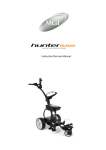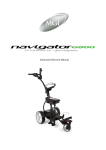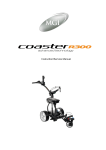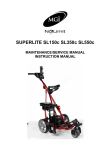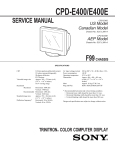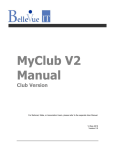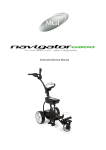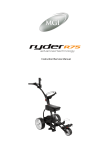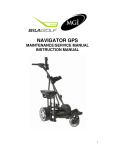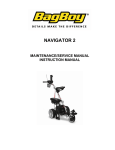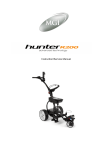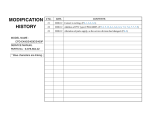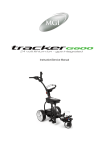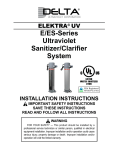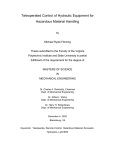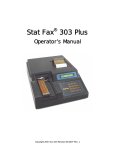Download NAVIGATOR NVR750c - MGI Motorised Golf Buggies
Transcript
NAVIGATOR NVR750c MAINTENANCE/SERVICE MANUAL INSTRUCTION MANUAL INDEX MAINTENANCE / SERVICE MANUAL 1. 2. 3. 4. 5. 6. 7. 8. 9. 10. 11. 12. 13. 14. Foreword Important Warranty Registration Warranty Service Problem Warranty Policy Warranty Exclusions Parts Installed During Warranty Preventative Maintenance Program Cleaning Your Motorised Buggy Rear Wheel Axles Upper & Lower Bag Straps Correcting the Alignment of Your Buggy MGI Service Schedule: Service Record: INSTRUCTION MANUAL 1. Most Important points to read prior to using your buggy 2. Charging and care of the Battery 3. Fitting the Battery 4. Battery Lead Fuse 5. Fail Safe Connection 6. Attaching / Removing Wheels 7. Programming your Navigator for the chosen handle height. 8. Folding / Unfolding the Buggy 9. Fitting your Golf Bag 10. Positioning the Seat 11. Assembling the Umbrella Holder 12. Sand Bucket Loop 13. Engaging the 4th Wheel 14. The Front Wheel and Suspension System 15. Top Handle Control Box Features 16. Transmitter Features 17. The Navigation System – How it works 18. Cart Tracking 19. Useful Hints in Operating the Navigator NVR750c 20. Understanding your Buggy and Suggestions for Dealing with unusual Situations 21. Frequently Asked Questions 2 MAINTENANCE SERVICE MANUAL 1. Foreword Congratulations on the purchase of your Navigator NVR750c Buggy. To ensure continued efficiency of your MGI motorised buggy, regular maintenance at periodic intervals is essential. For guidance, this booklet contains a schedule applicable to the maintenance required at the appropriate times and a service record. 2. Important If operating in conditions such as those mentioned below, speed controls, clutches, frame alignment, adjustment, tightening and axle alignment should be serviced at more frequent intervals than specified in this booklet: a. playing more than twice a week b. damp or wet conditions c. rough, dusty or sandy conditions d. hilly conditions 3. Warranty Registration Warranty registration can be made either on-line at www.mgikaddy.com or using the warranty registration card supplied with your motorised buggy. It must be completed and returned to MGI within 14 days of purchase. 4. Warranty Service Problem Purchase date of the motorised buggy must be given before warranty is accepted for processing. In the event of a need for warranty service, either refer to the list of authorised service centres or call MGI on 1300 644 523 5. Warranty Policy MGI NVR750c - For a period of 12 months in respect of the electronics, wheels, clutches, drive dogs, axles, battery and charger and 24 months in respect of the frame, motor and gearbox, MGI or an authorised service centre or person will repair or replace free of charge any parts found to be defective in materials or workmanship under normal use provided that: 1. The NVR750c has been properly used, maintained and regularly serviced 2. The replacement or repair is performed by an authorized MGI service centre or the owner with MGI approval. 3 6. Warranty Exclusions - the following events void warranty: a. Any defect caused by misuse, negligence, accident or failure to carry out proper maintenance procedures. b. Any alteration performed by non authorised people or companies. c. Fitting of parts or accessories not recommended by MGI. d. Any damage caused by continued operation of the motorised buggy after it is known to be defective. e. Damaged seat support bracket on buggy chassis All implied warranties [save those preserved by statute] are excluded. Liability for consequential damages under any and all warranties are excluded to the extent exclusion is permitted by law. 7. Parts Installed During Warranty Warranty coverage for components installed during a motorised buggy’s warranty period shall consist of the duration of the buggy’s warranty period, provided the warranty installation is performed by MGI, an authorised service centre or the buggy owner on approval. 8. Preventative Maintenance Program To properly provide for the continued operation of your motorised buggy, MGI has introduced its Preventative Maintenance Program [PMP]. The PMP consists of work to be carried out by both the owner and authorised service centres. To properly maintain the warranty of your MGI motorised buggy, it is essential that this work is carried out. If the work carried out by the authorised service centre is to replace parts that are part of the maintenance schedule, the owner will be charged for the parts and labour. If the work to be carried out is part of warranty, MGI will bear the cost. 9. Cleaning Your Motorised Buggy [See Maintenance Schedule] For years of good operation, your buggy requires care and attention. Keep your buggy clean by using a cloth with warm water and a mild detergent. Do not hose down your buggy under any circumstance, as your buggy has electronic components. Ensure that the seat stem bracket and sand bucket loop bracket plastic inserts are cleaned to remove dirt and sand. In addition remove and clean the 4th wheel tube [see part 14 page 15]. 4 10. Rear Wheel Axles [See Maintenance Schedule] The rear wheel stub axles need to be lubricated regularly. Remove the rear wheels by depressing the spring clip and at the same time pull off the wheel. Apply Petroleum Jelly or light grease to the stub axles. Use a very small amount as the grease can attract sand. If you play in sandy conditions you should clean your axle and regrease fortnightly. To refit the rear wheels you will need to align the wheel’s four sided slot to its equivalent on the buggy to ensure the wheels are properly engaged. Ensure that the wheels are put on the correct side ‘L’ and ‘R’ [see part 6, page 12]. 11. Upper & Lower Bag Straps [See Maintenance Schedule] The upper and lower bag straps should be replaced as per the Service Schedule on page 5. The upper bag strap can be replaced by: 1. Removing the left and right hand straps form the upper bag support. 2. Undo and remove the screws holding the strap in position on the bag support 3. Remove and replace both bag straps. 4. Insert bag strap securing screws. Undo screws The lower bag strap can be replaced by unclipping it from the bag support and installing the new bag strap. 12. Correcting the Alignment of your Motorised Buggy [See Maintenance Schedule] RIGHT LEFT If during use, you find that the buggy veers to the right or left, please follow the instructions below to correct this problem: 1. If the buggy veers to the left, face the front wheel of the buggy and use the Allen key provided to screw the right bolt clockwise or the left bolt anti-clockwise. 2. If the buggy veers to the right, face the front wheel of the buggy and use the Allen key provided to screw the left bolt clockwise or the right bolt anti clockwise. Test run the buggy and repeat the process until the buggy runs straight. 5 13. MGI Service Schedule [NVR750c]: It is the owner’s responsibility to ensure that all periodical checks, necessary adjustments and services are carried out. If in doubt please contact the MGI service centre on 1300 644 523. Any work performed on your buggy should be recorded on your service record (see page 9) regardless of the work. Monthly NVR750c Wipe down the buggy with warm cloth after each use – see page 4 point 9 BO Clean 4th wheel – see page 16, point 14 BO Lubricate rear wheel stub axles – see page 5 point 10 BO Six Monthly Check and tighten all nuts and bolts BO/SC Check grub screws on bearing collars on axle bearings tighten as required BO/SC Check and tighten handle pivots BO/SC Check alignment of buggy - ensure that it runs straight – see page 5 point 13 BO/SC Yearly Replace handle grips BO/SC Replace rear wheel drive dogs BO/SC Replace rear wheel spring latches BO/SC Replace rear wheel drive hubs BO/SC Replace seat bracket & sand bucket loop plastic inserts BO/SC Replace fused battery leads BO/SC Replace top box label BO/SC Three Yearly Replace rear and front wheels – see page 10 point 5 BO Replace 4th Wheel Assembly – see page 16 point 14 BO Replace Upper & Lower Bag Straps – see page 5 point 12 BO BO = Buggy owner can carry out this work SC = Charged work to be carried by approved service centre BO/SC = The six monthly service can be completed by either an authorised service centre or the owner of the buggy. The tools to tighten all nuts and bolts are provided with your maintenance / service and instruction manual. As part of MGI’s Preventative Maintenance Program, if the six monthly services are carried out by an authorised service centre, you will be charged for that service. Each yearly service should also include the six monthly service. It is important for your warranty and the life of your buggy that the service record be observed and maintained. Monthly cleaning and lubrication need not be recorded on the service record. 6 14. Service Record For NVR750c SIX MONTH INSPECTION ONE YEAR INSPECTION 1½ YEAR INSPECTION TWO YEAR INSPECTION 2½ YEAR INSPECTION THREE YEAR INSPECTION 3½ YEAR INSPECTION FOUR YEAR INSPECTION 4½ YEAR INSPECTION FIVE YEAR INSPECTION 5½ YEAR INSPECTION SIX YEAR INSPECTION ADDITIONAL SERVICE ADDITIONAL SERVICE ADDITIONAL SERVICE ADDITIONAL SERVICE DATE: . INVOICE NO: DATE: . INVOICE NO: SERVICED BY: SIGNATURE: SERVICED BY: SIGNATURE: DATE: . INVOICE NO: SERVICED BY: SIGNATURE: DATE: . INVOICE NO: SERVICED BY: SIGNATURE: DATE: . INVOICE NO: SERVICED BY: SIGNATURE: DATE: . INVOICE NO: SERVICED BY: SIGNATURE: DATE: . INVOICE NO: SERVICED BY: SIGNATURE: DATE: . INVOICE NO: SERVICED BY: SIGNATURE: DATE: . INVOICE NO: SERVICED BY: SIGNATURE: DATE: . INVOICE NO: SERVICED BY: SIGNATURE: DATE: . INVOICE NO: SERVICED BY: SIGNATURE: DATE: . INVOICE NO: SERVICED BY: SIGNATURE: DATE: . INVOICE NO: SERVICED BY: SIGNATURE: DATE: . INVOICE NO: SERVICED BY: SIGNATURE: DATE: . INVOICE NO: SERVICED BY: SIGNATURE: DATE: . INVOICE NO: SERVICED BY: SIGNATURE: 7 Additional Service – this is to record any servicing outside the normal schedule. INSTRUCTION MANUAL 1. Most Important points to read prior to using your buggy: a. Charging and care of the battery [see below] b. Assemble the buggy placing the rear wheels on their correct side [see page 10] c. Programme your Navigator for the chosen handle height [see page 11] 2. Charging and care of the battery a. Prior to the first and after every use charge the Battery. The battery and charger comes with an easy connection system. Red to Red and Black to Black. Important: - The battery must be charged at least over night before its first use. b. Your battery is designed for 18 holes only. If you play more than 18 holes before recharging, the battery’s life could be compromised. c. Always recharge the battery as soon as possible after use, no matter how short the period of use. Your battery will charge best, lying flat, in a warm and air flowing location. Note: In winter, it is best charged off any concrete floor and preferably in a warm location within the house. d. During play, minimise the drain on the battery by avoiding taking your buggy into the rough whenever possible. e. Avoid as much as possible using the buggy to pull you up the hills. f. In between use, always leave the charger connected to the battery with power on. g. If you are not playing golf for sometime, you may disconnect the battery once it is charged. The battery will need recharging at least every 3 months and must be recharged prior to use. The battery should be stored in a dry and warm environment. h. The battery is a sealed battery. If you are intending to take your buggy and battery on air travel, we advise that you make contact with your airline prior to travel. i. Be very careful not to drop your battery. The battery casing is easily cracked and the battery’s subsequent life will be severely compromised. 8 3. Fitting the battery Once charged, the battery can be fitted to the buggy. The battery comes with a battery cover, carry handle and battery leads. a. Place your battery in the tray with the leads facing to the front of the buggy. b. The battery tray has a battery securing strap. c. The securing strap is to be used at all times as it protects your battery against damage from falling out. d. The battery lead can now be connected to the battery tray. Connect red to red and black to black. 4. Battery Lead Fuse Your NVR750c has a 40 amp fuse connected to the battery lead. The 40 amp fuse helps protect the buggy’s control board against a power surge. An extra fuse is supplied with your buggy. In the unlikelihood of your buggy stopping, the reason could be the fuse has blown. Check and replace if necessary. The replacement of the fuse will allow you to continue using your buggy. If the fuse blows, contact your service centre. 5. Fail Safe Connection: Your buggy has been equipped with fail safe battery connection. Your buggy will only start once you increase the speed control. 9 6. Attaching / Removing Wheels If your buggy comes with the wheels off, they should be placed in position prior to unfolding. You will need to put the wheels on the correct sides. The wheels are marked ‘L’ and ‘R’ on the inside of the hub. The left and right of the buggy is determined by looking from the rear of the buggy. You will need to align the four slots on the inside of the wheel with the same four on the drive dog on the axle. To engage the rear wheel, depress the quick release catch until the wheel is in place. Depress the quick release catch, whilst putting wheel in position on the axle Align the four slots on the wheel with those on the drive dog teeth. NVR750c Buggy Your NVR750c buggy uses a gear system, whereby the two rear drive wheels do not free wheel. The motor needs to be running for the buggy to move. Drive will only occur when the speed control is turned on. If for some reason your buggy stops operating during your golf round, your buggy can free wheel. Simply depress the quick release tag and at the same time move the wheel outwards about 10mm from its current position. Release the tag and allow the wheel to click into its outer position. By doing this, you have disconnected the wheels from the drive and they can rotate freely. 10 7. Programming your Navigator for the chosen handle height. For the electronic compass to work at its optimum, the compass must be calibrated to understand the handle height. The following steps outline how to do this. Step 1 Place your buggy on relatively flat ground with no steel around you for 20 metres. An area of approximately two metres square needs to be clear of all obstacles to allow the buggy to rotate freely. At this point it is preferable not to have your golf bag on your buggy, but it is not imperative. Step 2 On the top handle control box there is a button labelled ON/OFF. – If your buggy is on turn it off. Step 3 Choose the handle height that is most comfortable for you to use. Step 4 On the same top handle control box there is a “PROG” button. Press and hold until the red light flashes. This will take approximately five seconds Step 5 On the transmitter Press the “NAV ON” button – the buggy will now rotate on its axis in an anti clockwise direction for approximately 40 seconds. Once complete the compass is calibrated only at the handle height you selected. Step 6 Your Navigator is now ready for use. Simply turn your buggy on by pressing the ON/OFF button on the top handle. Important Notes about programming for the chosen handle height 1. If you choose to change the handle height at any time you will need to re program your buggy to reflect the new handle height. 2. In some situations the lowest handle height may not produce the best result. In this case another handle height should be chosen. 11 8. Folding/unfolding your buggy Practice unfolding and folding the buggy using the steps below. This means when you go to play golf you will be somewhat familiar with this task. 1. 2. 3. 4. Press the button on the lower folding mechanism and fold the lower handle Press the button on the upper folding mechanism and fold the upper handle Collapse the handle until both folding mechanisms lock into place Bend your knees and lift the buggy using the front lifting handle and rear lifting bar Step 1 Step 2 Step 3 Step 4 The following order of steps is suggested when folding your buggy down: a. Seat and stem off first b. Golf bag off second c. Battery off and directly into the boot of the car. This will save double handling d. Sand bucket and loop off e. Disengage 4th wheel after having removed and wiped it down [see page 15] f. g. Remove antenna Fold down buggy and place into the boot of the car 12 9. Fitting your Golf Bag a. b. c. d. e. f. 10. Separate the clip located on the top bag support. Expand the strap to be enough to fit around the golf bag. Place your golf bag on the buggy. Clip the top bag support strap in place. Pull the top bag support strap tight. The bottom strap should not be removed from its position and can be pulled over the bag by holding the webbed section of the strap and pulling it over the base of the golf bag. Positioning the Seat Place the seat stem into its position in the seat stem bracket on the right hand side of the buggy. MOST IMPORTANT: DEPRESS THE SEAT WITH YOUR HAND BEFORE SITTING. DO NOT USE THE SEAT ON UNEVEN SURFACES. Please note MGI does not warrant any set support brackets that are damaged or bent. 13 11. Assembling the Umbrella Holder Your buggy comes with an umbrella holder. The umbrella holder needs to be bolted into position. Simply follow the pictures above. When not in use the umbrella holder can be turned to its side. If you take your buggy home in your car, you may need to do that prior to folding the buggy down. Your umbrella holder can be adjusted both to the side and backwards and forwards. The umbrella is secured inside the umbrella holder by tightening the plastic bolt located near the top of the holder. DO NOT LEAVE YOUR UMBRELLA UP IN THE UMBRELLA HOLDER IN WINDY CONDITIONS. If the wind catches the umbrella, it could cause your buggy to tip over and cause damage, which will not be covered by warranty. 12. Sand Bucket Loop If your buggy comes with a sand bucket loop, place this in position at the rear of the buggy. 14 13. Engaging the 4th Wheel Important: To avoid damage to your buggy always engage the 4th wheel prior to playing golf, regardless of the terrain you are playing on. To engage the 4th wheel, pull on the spring loaded locking pin, begin to slide the 4th wheel back release the locking pin and continue sliding the 4th wheel back until the locking pin locates itself into position. The 4th wheel should be cleaned regularly. Remove the 4th wheel by pulling on the spring loaded locking pin, slide the 4th wheel all the way out of its housing. The 4th wheel can then be cleaned with a cloth. Then reinsert the 4th wheel into its housing and pull on the spring loaded locking pin. 14. The Front Wheel and Suspension System Your buggy has a unique front wheel system. The front wheel can swivel 360 degrees. The main advantage of this is that your buggy is highly manoeuvrable. You only need to turn the buggy handle and your buggy will turn. The suspension helps reduce the amount of shock the buggy will take when going over hills, bumps, ruts, etc… 15 15. Top Handle Control Box Features a. On/Off – Press the on/off button to turn the buggy on and off Press to accelerate the buggy. The longer you depress b. Forward Arrow – the button, the faster the buggy travels c. Down Arrow – This enables you to decrease the speed and also to operate the NVR700 in reverse. To reverse your Navigator NVR700, the buggy must first be stopped. d. The buggy will move in the backward direction only whilst you keep the down arrow depressed. If you take your finger off the down arrow the buggy will stop (safety feature). e. Buggy Mode – When the buggy is on, the green light means Navigation is on. The red light means Navigation is off. f. Battery Status – Battery Light (located on top handle control box) - when the battery is charged the light is green. If the battery status becomes red, you will only have a few holes to go and it will stop. g. Programming - If you need to change the operation of the buggy using programming features, the light will change to indicate that programming is happening. Please note: When you touch any of the buttons on the top handle control box, the buggy senses that you want to take personal control over it and will turn the Navigation system off. 16 16. Transmitter Features a. Forward Arrow Press to accelerate the buggy. The longer you depress the button, the faster the buggy travels. Please note: If you wish to regain the speed you were travelling at prior to the last stop, simply press the forward button twice in succession. The buggy will accelerate to the last speed setting. This feature works only when you press the stop button to stop the buggy rather than pressing the down arrow. b. Down Arrow Decreases the speed and provides for reverse. If you are moving forward, the down arrow can be used to decrease speed, the longer the pressure, the slower the speed until it stops. To operate the Reverse mode you must stop the buggy first. Press the down arrow and the buggy will reverse. To increase the reverse speed, depress the down arrow until the desired speed is obtained. To stop the buggy whilst in reverse and using the transmitter press the Stop button. c. Left and Right Arrows Press the appropriate turn command and keep pressed until the degree of turn achieved. Momentary pressure will make a small adjustment to the direction, whilst prolonged will increase the amount of turn. d. Soft Braking - the Navigator NVR750c is equipped with electronic soft braking. This means when you apply a left or right turn for less than a second, braking will be soft. This is most useful when you are using your buggy to make small or part turns. If you press either turn button for more than one second, your buggy will sense you are wanting a strong turn. At this point full braking is applied. e. Indicator Light - [in top right corner of transmitter] each time you press a command using the remote, the light in the top right corner of the transmitter will display a green light or red light. The green light indicates the Navigation system is on and the red light indicates the Navigation system is off. 17 f. 17. Transmitter range and Heart Beat: The range of the NVR750c is up to 200 metres [220 yards]. Your NVR750c also has a heart beat between the transmitter and receiver. This means that they stay on contact with each other at all times. If for some reason the buggy was to go out of range of the transmitter your NVR750c will stop automatically. The Navigation System – How it works. a. Navigation on [Nav On] - by pressing “Nav On”, the Navigation system is turned on. The indicator light on the top right hand side of the remote will illuminate green each time you use a command whilst Navigation is on. The Navigation system when turned on will ensure the buggy will maintain its direction regardless of the terrain. The buggy will automatically brake or accelerate either wheel to maintain its direction. Useful hint: On a steep incline, the gradient may force the buggy off line. You do not need to adjust the buggy. The buggy will works its way back on course. In addition, if the buggy hits a tuft of grass or other object, the buggy will momentarily be forced off course. Do not be concerned. The buggy knows where to go and will get back on track quickly. b. Navigation off [Nav Off] - by pressing “Nav Off”, the Navigation system is turned off. The indicator light on the top right hand side of the remote will illuminate red each time you use a command whilst Navigation is off. Important: When you use the controls on the buggy’s handlebar, the Navigation system turns off automatically. This will enable you to manoeuvre the buggy. The mode light on the handlebar will turn red when Navigation turns off. When you change from using the handlebar controls back to the remote, the buggy remembers if the remote was in the mode of “Navigation On” or “Navigation Off”. If the last command on the remote was with Navigation on, the first command using the remote will also be Navigation on. If that is not what you want, simply press “Nav off “and the Navigation system will turn off. When your buggy is turned on, the remote control can be used in the same way as the controls on the handlebar. 18 18. Cart Tracking Your Navigator is designed to track straight on level ground in the “Nav Off” mode. The twin motors are synchronized with your buggy at production. If for some reason (for example, your golf bag is not evenly weighted) your buggy does not track straight, adopt the following procedure to get the buggy to do that. Firstly complete steps 1 to 4 to cancel the existing program using the electronics top box. Then, complete steps 1 through to only 3 using the top box and then follow up with steps 5 to 8 using the transmitter. Top Handle Control Box Step 1 Turn Cart Off – Press “ON / OFF” button. Step 3 Press “reverse arrow” – “PROG” light will now flash green. Step 2 Press and hold “PROG” button for 5 seconds – red light will flash. Step 4 Press the “STOP” button on the top box. Existing speed compensation / correction has now been removed. Transmitter Conversely, the same operates if the buggy moves to the right. Simply press the “left turn” arrow a number of times until the buggy tracks straight. Using the transmitter Step 5 Press “forward arrow”. The cart will now move forward. Watch how straight the buggy goes. Step 7 Once the buggy is tracking correctly press “STOP” on the transmitter. Step 6 If the cart moves to the left it means that the R/H motor is running quicker than the L/H motor. Step 8 Please note if you are unhappy with the outcome you will need to repeat the entire process. You then need to adjust the speed of the R/H motor by pushing the “right turn” arrow a number of times. 19 19. Useful Hints in Operating the Navigator NVR750c a. Your Navigator NVR750c has sophisticated electronics onboard. Avoid sending your Navigator through puddles of water. The electronics are designed to handle all types of bad weather, but not to be immersed in water. b. Use handlebar controls in car parks. The Navigation system can be upset around steel products. c. Use handlebar control in confined spaces. To maintain maximum control in confined spaces such as pathways it is recommended that the remote is not used. d. Your NVR750c has a range of up to 200 metres Golf etiquette is essential at all times. Do not operate your NVR750c in the vicinity of people playing their shots. e. Trust your Navigator – When operating in “Nav on” mode, you do not need to constantly adjust the Navigator’s direction. If the NVR750c is diverted from its course by uneven surfaces or steep inclines, the Navigator will quickly correct its position to regain its former course. 20. Understanding your Buggy and Suggestions for Dealing with unusual Situations The Navigator NVR750c is the product of many years of research and development and the result of many years of evolution on the golf course. We have listed some unusual buggy behaviours and given suggestions to check and correct. This list is not a stepped list. Situation 1: The Navigator buggy stops responding to its remote control. What to do: If the transmitter battery has not been replaced for sometime, then this could be the cause of the transmitter not working. Also, check the battery terminals inside the remote control to ensure they are clean and provide good tension against the battery when the battery is re-installed. • • • Replace the battery. The battery should be replaced every six months or less if used often. Ensure you are using YOUR remote control, not one from another Navigator Check that the LED on the top right of the remote changes colour when you press “Nav Off” [red] and “Nav On” [green]. If there is no colour or the colour does not change, remove and reinstall the battery. When Replacing or reinstalling the transmitter battery ensure the battery is installed the correct way: positive to positive and negative to negative. Check the remotes operation again. • Check that the buggy’s wheels are properly engaged with the drive dogs on the axles. If the rear wheels are not properly engaged, the Navigator will not move. 20 • • • • • Check that the buggy has not been accidentally turned OFF by the “ON/OFF” button Check that the main battery is properly connected. At this point, disconnect the battery lead from the battery tray and then reconnect. Check to see that the battery indicator light on the Top Box is green and that you have more than one light on the battery level indicator on the battery tray. Ask yourself, was the main battery charged after its last use? Check to see if the Navigator responds normally to the operation of the Top Box buttons. If not, disconnect the buggy battery and check both battery connector parts for dirt or damaged contacts. If OK, re-connect the battery and check the buggy’s operation again. If the remote still does not operate, contact your MGI service agent. Situation 2: The buggy remote range is not up to expectation or has reduced over time. . • Check that the Antenna is fitted on the Buggy’s top box. Your buggy will work better with an antenna • Check that the Antenna connection is firm. If not firm, re-tension the antenna plug. • Check the remote’s battery. It could be near flat and requires replacement. If you have not replaced for some time it should be replaced. Each six month’s it should be replaced. If you play a lot of golf, it may need replacing more often Most Important: The Navigator’s remote uses radio frequency (RF) transmissions to control the buggy. On some occasions, it is possible to experience RF propagation problems, which can temporarily reduce the control range. In addition, the buggy can be ‘deafened’ by some close-by RF interference. Situation 3: My Navigator does not always keep on the “straight and narrow”. The Navigator uses highly sophisticated and patented electronic compassing to steer the buggy when in ‘Nav On’ mode. The compass system is tilt compensated to enable true steering over a wide range of grades, which you could expect to encounter on the average golf course. In reality, there are some circumstances or locations where the electronic compass may not accurately steer the Navigator. These conditions are described below: • Your Navigator comes with a multi positioned handle. The handle may be in a position other than the position in which the compass was calibrated. If this is the case, the compass must be re-calibrated with the handle set at the desired height. Please refer to the buggy setup procedures within the manual. Once this procedure is completed, your buggy’s compass will be calibrated for the new handle position only. The procedure will need to be repeated if you change the handle height when you have the buggy in the “Nav On” mode. • When the Navigator is travelling across the side of a grade, it will tend to keep the nose of the buggy pointed in the correct direction but will slip or crab sideways down the grade. The magnitude of the sideslip is variable but is mainly dependent on the gradient and the buggy’s speed. The Navigator will perform best across a gradient when its speed is less 21 than full throttle. This will enable the Navigator to increase speed and brake to better stay on course. • When the Navigator is used in or approaches areas with a significant amount of steel or other made of iron material the Navigator’s performance is compromised. Areas such as car parks, near steel sheds, steel bridges and fences or large underground steel pipes cause distortions in the local earth’s magnetic field. Such distortions affect the control of the Navigator. Therefore, the “Nav Off” mode should be used when in or near each of the areas referred to above. When the Navigator has passed theses affected areas normal navigation can be resumed. • The buggy’s steering can also be affected by the proximity of large steel headed clubs / drivers for the same reason as the point above. If you use such clubs, their location within your bag is important. The compass sensors are located inside the buggy’s top box towards the front face. Always place steel headed drivers and putters as far as possible away from the top handle control box. In addition, it is advisable to choose the middle handle position. Most important: You must reprogram your buggy if you change the handle height. • In addition, minimising side to side movement of the heads of these clubs will help optimise the Navigator’s performance. • The earth’s magnetic field is not of equal strength in all locations and its characteristics change between the equator and either of the poles. In some situations, when the Navigator is travelling predominately north or south and is travelling up or down a particular gradient, the compass may not detect enough field by which to steer. In such circumstances, the Navigator may wander off course. You will quickly learn if your favourite course has any of these rare ‘black holes’. If you do encounter one such location on your course, the best action is to operate in “Nav Off” mode until the area is cleared. MOST IMPORTANT: Do not have magnets or magnetised steel come near the buggy top box. The Navigator is very sensitive and any magnetic force introduced to it will affect the Navigator’s performance in the “Nav On” position. 21. Frequently Asked Questions and Answers: Question: Answer: Is it important to register my purchase for warranty purposes? You must register your purchase as soon as possible with MGI. You can register on line at www.mgikaddy.com or through the mail. The serial number for your buggy is located underneath the top handle scorecard compartment. Question: Answer: How often should my battery be charged? Your battery should be left on charge in between use. After playing, put your battery back on charge as soon as possible. Leaving your battery in a discharged state will shorten its life. 22 Question: Answer: Should I discharge my battery fully to remove memory? NO – Gel batteries do not have memory issues. Fully discharging the battery will damage it and the charger will not be able to recharge the battery. Question: Answer: Where can I take my buggy to be serviced? There are more than 80 service centres across Australia - please check out our website www.mgikaddy.com for an up to date listing or contact us on 03 9873 4433 or 1300 644 523. In Melbourne you can also bring your buggy to our main service centre at head office at 11 Maurice Court Nunawading (Melways Ref: Map 48 H11). In the Melbourne & Sydney areas, there are mobile service vans that attend most golf courses and retailers. Question: Answer: My buggy does not track in a straight line a) Ensure that the cart is in the “Navigation On” mode. See “Using your Navigation System” b) See Cart Tracking Adjustment Procedure c) If problem persists please contact the service centre. Question: Answer: My buggy turns in circles. a) Ensure that each rear wheel is locked in position. b) If the wheels are locked in position then the drive pin on the drive dog may be broken. c) If problem persists please contact the service centre. d) Check the status of your main battery. Your buggy will go in circles when the battery is near flat. Question: Answer: My buggy does not respond to my remote. a) The battery inside the remote most probably needs replacing. b) If the battery is okay and your buggy works in the manual mode please contact the service centre. MGI invests large amounts of capital into advancing the mechanical and electronic features of its range of buggies. Should you have any feedback or suggestion, which would further enhance the performance of our buggies, we would welcome your correspondence. If you have any concerns relating to the use of your motorised golf buggy do not hesitate to call us at 1300 644 523. Thank you for your assistance and continued support. Most importantly please provide us with your email address so that we can forward to you technical updates and other information. Please email MGI on [email protected] 23
























